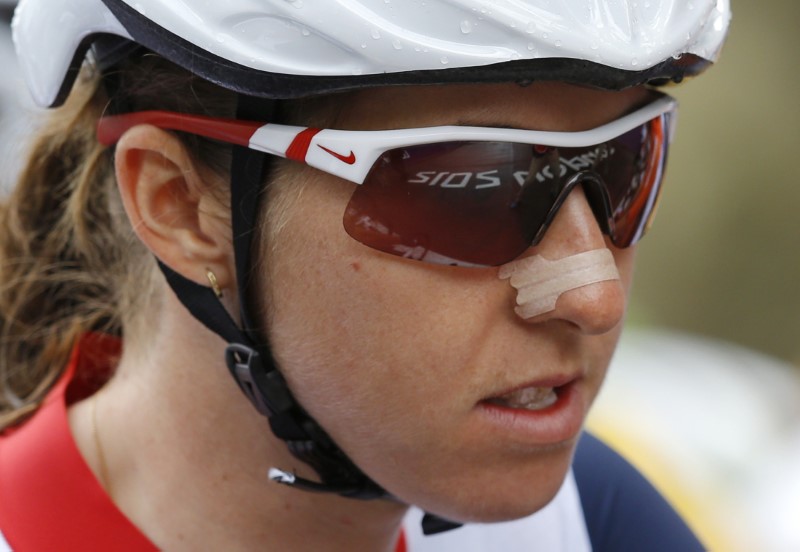LONDON (Reuters) – Former British cyclist Nicole Cooke questioned Team Sky’s drug-free credentials and said she was “skeptical” of Bradley Wiggins’ use of Therapeutic Use Exemptions (TUEs) in powerful evidence delivered to a British Parliamentary committee on Tuesday. The 33-year-old former Olympic and world champion launched a fierce attack on measures in place to combat doping which she described as “the wrong people fighting the wrong war, in the wrong way, with the wrong tools”. Painting a damning picture of how “a sport run by men for men” is governed, Cooke was the latest prominent figure to appear before parliament’s Culture, Media and Sport Committee which is investigating doping in sport. Team Sky chief Dave Brailsford and British Cycling’s former technical director Shane Sutton, whose evidence Cooke said did not “ring true”, also gave evidence to the committee.
Cycling has been rocked by revelations that a mysterious jiffy bag containing medication was transported to France by British Cycling women’s team manager Simon Cope for Wiggins and Team Sky at the 2011 Criterium race. It has also been revealed that Wiggins, who suffers from asthma, applied for three TUEs for the substance triamcinolone acetonide between 2011 and 2013.
“Taking TUEs just before major events, it raises questions for me,” Cooke said. “It makes me skeptical of what they have done.
“I find the stance of being the cleanest team, yet Dave Brailsford not being able to say what a rider took, definitely makes it hard to back up that claim.”
Brailsford told the committee the bag contained Fluimucil, a legal decongestant, although no written evidence has been provided to back this up.
Cope said he did not know what he was transporting.
“I do find it very surprising that Simon Cope transported something internationally without knowing what was in it,” she told MPs.
“I find that astonishing and the fact that when British Cycling were asked for the records they weren’t able to find the documentation, I find that surprising.”
Cooke supplied written evidence followed by an hour’s testimony via video link from Paris.
KNEE INJURY
She revealed that she had obtained four TUEs during her career, three for a knee injury and one for asthma, using the same drug as Wiggins although, unlike him, she did not race immediately after her injections. “I was aware that this was performance-enhancing and I had a significant discussion about that with the medical team and the coaching team before we agreed it should be administered. It was a case of injection or surgery,” she said. In her earlier written evidence, Cooke was critical of the way the whole process is overseen.
“If the TUE process were to be reliably controlled, then an athlete would not be able to abuse its use out of competition to prepare for a big event…It would not be lost on many of the unscrupulous that a TUE was a very convenient way of masking a doping program,” she said. Cooke also hit out at what she said was sexism at the heart of British cycling, pointing out that Cope, whose salary as women’s coach came from the public purse, should have been concentrating on his own job rather than delivering the package to Wiggins. “Cope was doing what he was told to do,” she said. “Shane Sutton states he approved Cope’s trip with the jiffy bag. Nobody in the organization anywhere would have asked the question – hasn’t Cope got another job to do?” Cooke frequently stressed that there was a lack of governance and accountability at the heart of British cycling and UK Sport. She also bemoaned the sexism that existed.
“The facts are they did nothing for the women. Whilst a deluxe program ran out for the men’s London 2012 bid, Emma Pooley and myself self-funded our flights to and accommodation in Australia,” she said. Asked if sexism was culturally embedded in British cycling she said: “Yes I do”.
(Reporting by Neil Robinson, editing by Ed Osmond)
Briton Cooke questions Sky’s drug-free credentials

Reuters


















